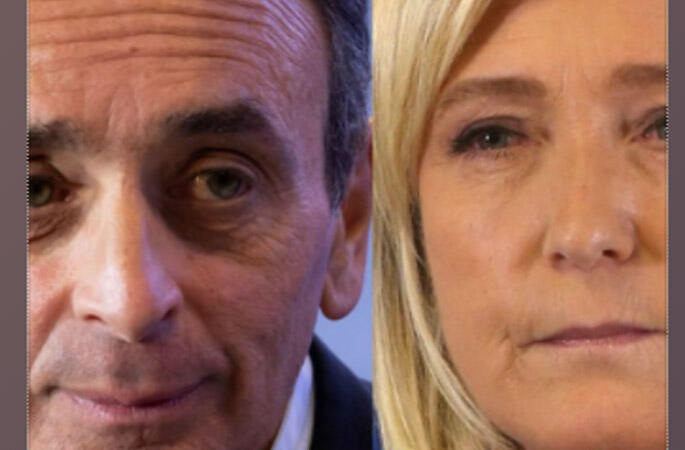Who is France’s far-right firebrand and presidential hopeful Eric Zemmour?
He's not even officially a candidate for the French presidency, but political pundit Eric Zemmour is already predicted to reap 13 percent in the first round vote, should he run. Twice convicted of hate speech, the sharp-tongued journalist and writer is riding high on an anti-immigration platform, boosted by a media frenzy not seen since Emmanuel Macron declared his candidacy in 2016.
Issued on:

A Harris Interactive poll published this week put Zemmour just three points behind Marine Le Pen, leader of the hard-right National Rally, who is tipped to face Macron in the second round of next April’s presidential election.
Openly anti-immigration and anti-Islam, Zemmour recently said he favoured forcing people to give their children French first names because "calling your child Mohamed amounts to colonising France".
On Tuesday, President Macron referred to Zemmour for the first time, though not by name.
"We often pose the question of identity in political debates," Macron said, "but our identity has never been built on narrowing [things down], first names or forms of tension."
Macron and Zemmour have little in common apart from the fact neither has officially thrown their hat into the ring, and both know to create a huge media buzz.
Zemmour's piercing look stares out of many a news stand, most recently on the front cover of Paris Match, bathing in the Mediterranean with his young female “adviser”.
In the space of a week he’s been on a dramatically staged BFMTV debate and another on LCI, as well as interviewed on Paris Première and Europe 1 among other media. And the presidential polls are still seven months away.
So how did Zemmour get here?

Journalist, writer
Zemmour, 63, was born in the Paris suburbs to a family of Berber Jews who came over to France during the 1954-62 French-Algerian war.
After failing to get into the elite school of administration (ENA), he headed into journalism and until recently was a regular columnist for the conservative daily Le Figaro.
He’s proven to be a successful writer. His 2014 book Le suicide français (The French Suicide: 40 years that defeated France) argued that neoliberalism had sent France into decline. It became a bestseller.
His latest, self-published, essay La France n'a pas dit son dernier mot (France Hasn’t Said its Last Word) reportedly sold 78,000 copies in its first week.
Zemmour's reputation as France’s most famous right-wing ideologue owes much to his regular appearances on CNews, a television channel resembling the US’s Fox News, which supported Donald Trump. He was a star on the daily Face à l’info (Facing the News) debate, which peaks at more than a million viewers.
Polemicist
The show has allowed Zemmour to explore some of his favourite themes such as immigration, Islam and French identity.
He's in favour of ending the right to French nationality through birth on French soil, and restricting some state benefits to French citizens. He promotes the “grand remplacement” conspiracy theory that claims white Europeans are being replaced by immigrants.
Zemmour has twice been convicted of racial and religious hate speech.
In 2010 he said “most drug dealers are black and Arabic” and in 2019 he compared Muslims in France to “colonisers”.
He has also called for two million foreigners to be expelled from France, including students from the African continent.
On 13 September he stepped down from the Face à l’info show, giving perhaps the clearest sign yet that he may be preparing to announce his election candidacy.
It came after France’s audio-visual watchdog (CSA) judged Zemmour to be more of a politician than a journalist – meaning his media appearances must now be limited, as they are for other political figures during electoral periods.
Shift to the right
While the French government has been critical of Zemmour’s views, it appears to be responding to the “Z” factor in shifting its own policies further to the right.
On Tuesday the government announced a drastic reduction in the number of visas France would grant to Tunisia, Algeria and Morocco after they had refused to take back nationals whose visa requests had been refused by France.
Then on Wednesday Interior Minister Gerald Darmanin announced the government had closed mosques and associations that he said were controlled by radical Islamists.

Splitting the vote
The mainstream right is also finding it difficult not to march to the beat of Zemmour’s drum.
Former Brexit negociator Michel Barnier, who is running to be the centre-right Republican (LR) candidate for the presidential polls, raised eyebrows when he recently called for a three-to-five-year moratorium on immigration.
The person who in theory stands to lose most if Zemmour continues to rise is far-right personality Marine Le Pen. Fighting mass immigration and radical Islam has, until now, been her bag – and kept her high in the polls.
This week she called for a referendum on citizenship, identity and immigration control.

Zemmour claims Le Pen poses no threat. “Marine Le Pen would never win, and everyone in the National Rally knows it,” he told France 2 television.
Rejection
Zemmour may be over-confident. He has little political experience, has never held elected office and has no party behind him.
What's more he remains a deeply divisive figure among the French public overall.
A survey published by Odoxa-LCP-Public Sénat on Wednesday found he was the most rejected political figure (59 percent), ahead of hard-right Florian Philippot (55 percent), hard-left Jean-Luc Melenchon (54 percent) and Marine Le Pen (52 percent).
Daily newsletterReceive essential international news every morning
Subscribe